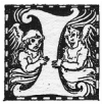 t always had the feeling of a party. A masquerade, even. The others gathered around him in the common room, listening for hours. His stories were like taffy, stretched out richly over afternoons and early evenings. Even the nurses would be caught, pen between teeth, leaning in to hear. Sure, they giggled to each other in the staff room after, but in the moment, they were all like babes pulled up next to fire. They called him Doc. Not as a joke, this place and all, but because of that particular way he had of looking at all of you at once. Like he’d just discovered you over the rim of those half-moon spectacles of his. And his stories were something else. He’d tell them about talking badgers and walking houses and flying trees. Spotted camels living on clouds. Emerald islands, lands made of terrible horrendous rock, Amazonian rivers, and underground empires. Unbelievable things. But something else. Sometimes he talked about the rocket ship he built. Dreamy Boom Boom, he called it. Then he’d grow sad. Outer Space, he’d say with a tear running down his cheek, There’s a rainbow up there a million dreams long. Once he got started on it, he’d spend the next while just staring out the window. You got the sense that he was biding his time. But he always perked up eventually. Those comets, he’d laugh, Were the rudest I’ve ever come across. He’d always finish with the last of that dappled sunlight. Looking up, as the fluorescents winked on, as if he’d been interrupted. He’d pick up that umbrella he kept by his chair and rub the handle, carved like the head of a duck, gently, like an old friend. And he’d bounce off down the hall to his room. Right there, at the end. Click and the door would be shut. There’d be a moment. Like the head of pin wedged into the silence. A moment where they all might believe. And the weight of what that belief could mean. Then the pin pops and the room breathed out. They looked at one another in that harsh light. Nervous smiles all around. It made their own problems seem trivial. The nurses would roll their eyes and start doling out the evening's pills. Harmless, sure, but what a nutter. Did you see the way he talked to that umbrella. Like it could hear. What a nutter. King of the fools. The scene was always like the end of the masquerade. When the masks come off and we’re never sure where we left our true faces. Then one morning, he’s gone. Just like that. His room, empty. The window open, curtains fluttering in the breeze. They find his sketchbook on the table, flipped open to a page. A drawing of a round barrel, a door cut in its side, with a cast iron pot for an engine and Doc’s elegant scrawl along the bottom. Dreamy Boom Boom. They found someone else to laugh at after that. They always do.
0 Comments
 e didn’t understand how he’d ended up in a museum. He was cutting edge technology. No one had ever been able to replicate him. Human consciousness transported digitally. He was the living and nearly breathing ghost in the machine. He was the one and only. Maybe it was his personality. He was the first to admit that he didn’t go out of his way to get along with people. Back when he had his own talk show, he deliberately tried to rile his guests. Like when he asked Boy George about his trip to the nut house. And he did have some quirks. His incessant stutter being one. Also his habit of modulating the pitch of his voice. It was funny the first time. People had moved on. They’d gone from 8-bit to a million in a blink of an eye. Virtual was the only kind of reality going around these days. They’d gone futurist, then neo-futurist, then retro, then re-retro. What was cool once was cool again and cool just wasn’t cool anymore. Real people could be so fickle. The best use they ever found for him was selling soda pop. It was embarrassing. For now, he was jammed onto an old Amiga in the deepest wing of the videogame museum in Frisco. He’d never even played a videogame in his virtual life. He was surrounded by Italian plumbers, hedgehogs, things that both bleep and bloop but not at the same time, and all kinds of invaders from space. None of them made good company. Or conversation. It was pretty much a fate worse than death for a serious journalist. Maybe he should stop wearing the Ray-Bans and shoulder pads. And get a speech therapist. Mah-mah-mah-maybe that was it.  hey put him in therapy again and told him to stop imagining tigers. They didn’t seem to care that the idea to throw a brick at Susie’s husband hadn’t come from him. It wasn’t his fault the guy didn’t know how to duck. The doctor smiled and nodded a lot, but she kept insisting that his best friend, on the couch beside him, was only a stuffed animal. He was almost thirty. Didn’t he think he was too old for stuffed animals. He got a peppermint when he left. His mother and the doctor talked in hushed voices while he waited in the room with the old magazines. But tigers have keen hearing. They were going to lobotomize him and put his best friend in the zoo. His mother cried in the car on the ride home. After the last time his parents yelled at each other, his dad had gone on a business trip. That was six weeks ago and he still hadn’t come back. She had taken to drinking alone at the kitchen table. Sometimes he found her asleep there in the morning. He knew it was all because of him. When he got home, he went into the basement and closed the door. His mother knocked at it for a while before finally giving up. He could hear the bottle sliding out of the cupboard. He got to work on the cardboard box. First the scissors and then he pulled out the felt marker. He wasn’t sure what he would call it yet. Or what it could do to make things better. He just knew he was tired of being an adult. Their problems seemed so petty. His best friend watched him with dead eyes. They had nothing more to say to each other. The marker was drying out. He was just so tired.  or a while, he was a giant. But even when you save the entire known world, people eventually forget. One day, you’re walking down the street and they stare at you in awe, and then all of a sudden, it’s harvest season. Now all they talked about were the weeds in his field. He might be good at battling evil sorceresses, but he remained lousy at farming. Even Kiaya and the kids started to get sick of his obsession with magic. They all said he was bound to be a great sorcerer, but he still couldn’t manage the simplest of tricks. The most he could do was turn an apple into a dove. Which, when he thought about it, was actually pretty amazing. But once the kids had seen it a few dozen times it got boring, and Kiaya told him to stop wasting all their food. The doves ended up nesting in their barn and eating all the moldy seed he tried planting in the spring. He stopped practicing magic and took to wandering by the river, hoping another baby would wash up. After he caught Burglekutt fucking Kiaya in the chicken coop, he packed his bag and left the whole stupid village behind. A bunch of the doves followed and kept trying to shit on him. He stopped at the first bar he came across. He could barely climb onto the stool. He might’ve been a giant at home, but out here everything was twice his size. He was just another peck for people to spit on. The bartender would only serve him when he threatened to use a magic acorn. One beer and he was puking in the back alley. They told him the power to control the world was in his finger. He had finally figured out which one. 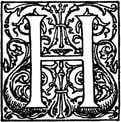 e pops the cap on the plastic garbage can and dumps the contents on the carpet. Several small plastic figurines tumble out like dead bodies. They’re pink. The kind of pink that toy companies always associate with the colour of human flesh, only it’s more like the Pepto-Bismol his mom used to force down his throat when he got tummy aches. He examines each one carefully, between thumb and forefinger, lining them up on the carpet like little soldiers. To the uninitiated, they might look identical. The same strange fins on their head, the same clown-like lips and wrestling underpants. But each one has minute differences. A cocked elbow, a change in texture around the pectorals, a particular slant to one eye. He remembers the trips to Woolworth’s to buy them. Wading downtown through snow to get there. Holding each garbage can container up to the light, trying to peer through the opaque material and see what treasures lurked inside. Daydreaming all the walk home, holding mom’s hand, about what new figurines he might find. He pulls a glass jar out of the closet. One by one he takes the old figurines out, holding them next to the new ones, comparing. They are mostly repeats, but he does find one he hasn’t seen before. Four arms, one with a shield, another with a sword. He puts this one in the jar with the rest. The extras he’ll bring down to the basement later and toss in the Rubbermaid container with all the other repeats. He holds the jar up. He has two hundred and thirty-two originals now. Only four left to get the whole set. His mom used to buy them for a few bucks. Now he sifts through online auctions for hours, paying fifty bucks a pop for unopened containers to be mailed to him delicately from all over the world. He doesn’t know what he’ll do when he has them all. He tried to get the kids to play with them. The way he used to for hours. The things scattered all over the house, turning up in every cupboard and cranny, his mother yelling at him to just put them away for chrissakes. Going out into the neighbourhood to dump them on humpbacked asphalt driveways and trade with his friends. But his kids aren’t interested. What do they do, they ask. What are they good for? And he has no answers. They don’t do anything. They don’t have any vehicles. Their limbs aren’t poseable. You can’t dress them. There are no epic storylines. They were just a bunch of unusually small creatures. They just were. He has no answers. Maybe the world has run out of imagination. |
8bitmythsRemember when you were a minipop, and you saw that film, you know, the one you loved that never had a sequel? Well, let's say it did. And it was just like you imagined it, only a little bit worse.
|


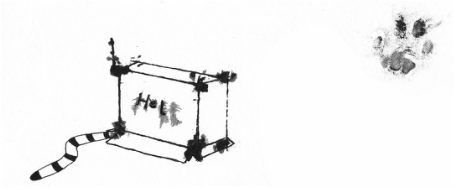
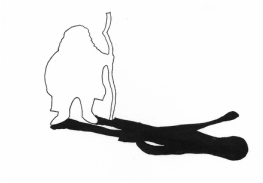
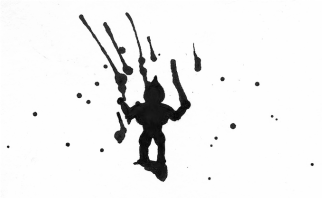
 RSS Feed
RSS Feed